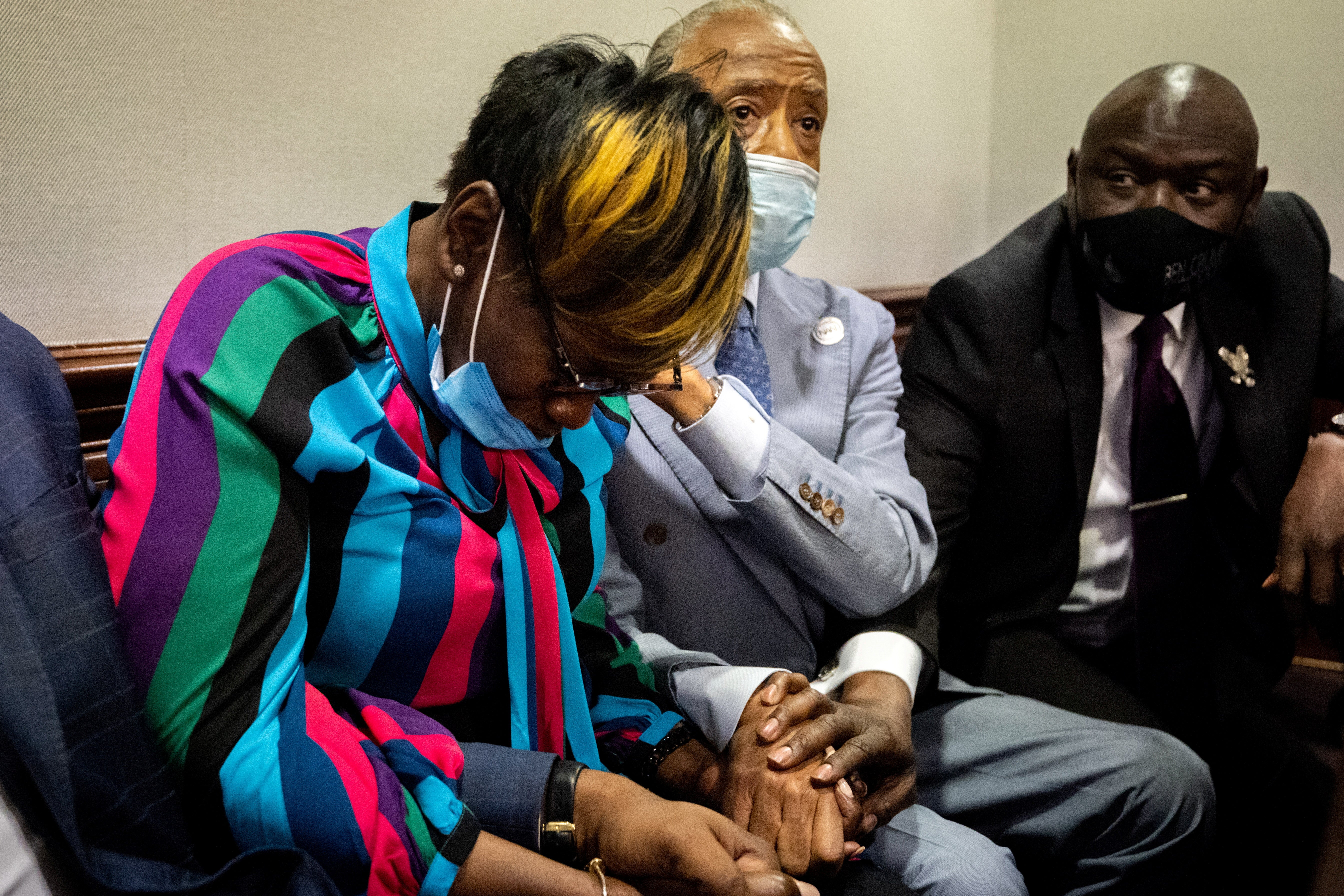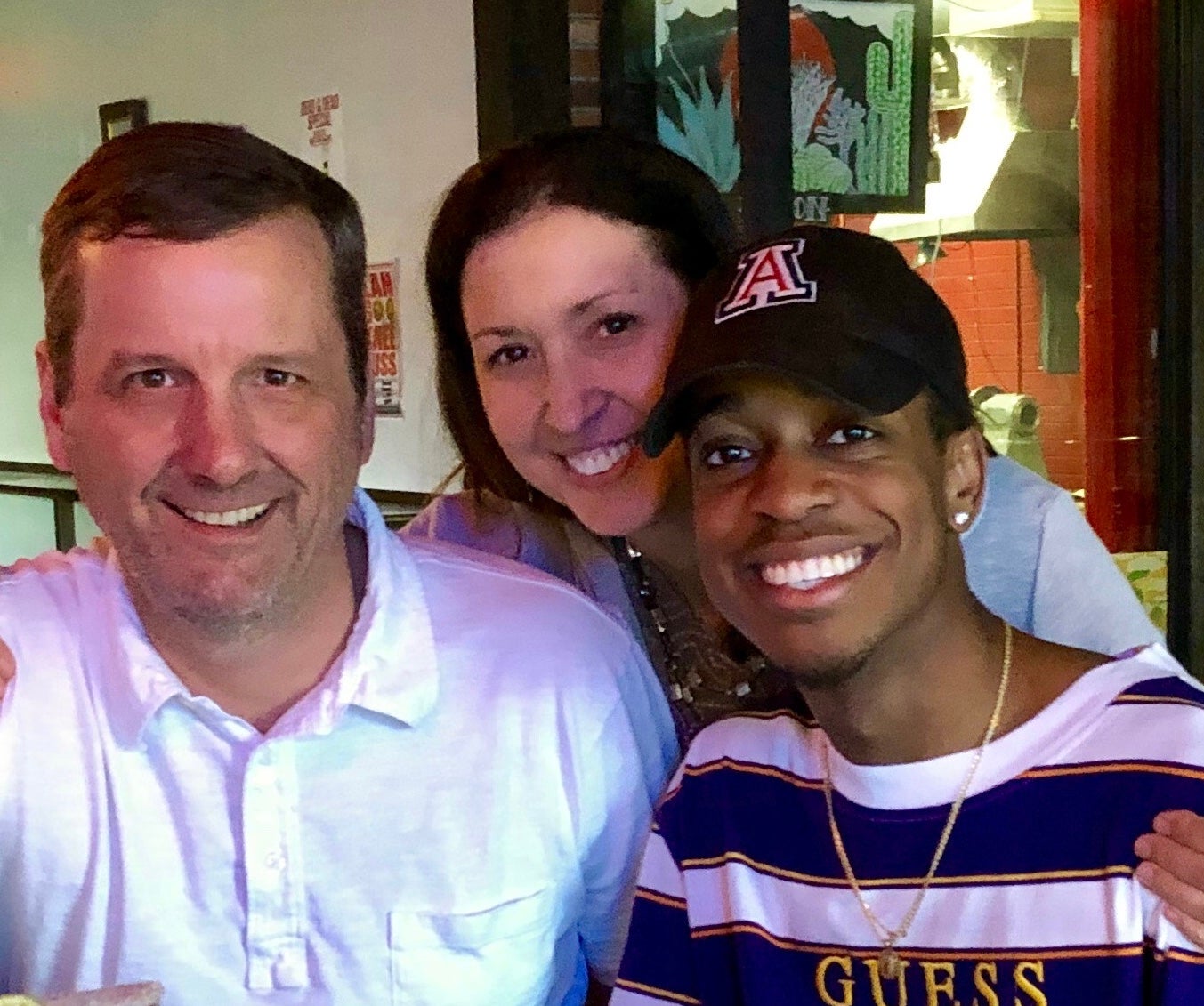What Ahmaud Arbery’s murder means to me, the white mother of a Black son
When he was fifteen, my son was also stopped by a police officer for ‘running while Black’. It was a wake-up call

Your support helps us to tell the story
From reproductive rights to climate change to Big Tech, The Independent is on the ground when the story is developing. Whether it's investigating the financials of Elon Musk's pro-Trump PAC or producing our latest documentary, 'The A Word', which shines a light on the American women fighting for reproductive rights, we know how important it is to parse out the facts from the messaging.
At such a critical moment in US history, we need reporters on the ground. Your donation allows us to keep sending journalists to speak to both sides of the story.
The Independent is trusted by Americans across the entire political spectrum. And unlike many other quality news outlets, we choose not to lock Americans out of our reporting and analysis with paywalls. We believe quality journalism should be available to everyone, paid for by those who can afford it.
Your support makes all the difference.It could have been my son. As the white mother of a Black son, that thought crosses my mind each time I think about Ahmaud Arbery, the 25-year-old runner who was murdered while jogging near his mother’s home in Georgia. Today, I look to our justice system once again for hope as a judge sentences the three men convicted of murdering Arbery.
My son and I were in the car together when we learned that a predominantly white jury had found the men who killed Arbery guilty of murder. I had just pulled into a parking spot outside the grocery store. Upon hearing the news, I grabbed my son’s hand and we both exhaled heavily. We sat in silence for a moment, taking in the impact of the jury’s decision.
The verdicts, of course, could not bring Arbery back, just as the sentences – mandated by law to be terms of life in prison with or without parole – won’t heal his parents’ shattered hearts. The jury’s recognition of the humanity of a young Black man, however, was a balm of sorts for those of us who had feared that justice would not be served.
Arbery’s murder evoked more than an abstract fear in me. At fifteen, my own son was stopped by the police while running a few blocks from our home in suburban Chicago because he “fit a description.” He was home that day because the private school he attended in the city had off. In the early afternoon, he decided to go for a run, pulling on his black running shorts and white T-shirt, slipping on his bright red Nikes, donning his Beats headphones. He chose a route past our local public high school, which was in session at the time.
I was at the downtown office where I worked as a corporate lawyer when he called.
“Hey, handsome,” I said, greeting him in my usual way.
“Hi, Mom,” my son said, his voice catching slightly. “There’s a policeman here who wants you to come pick me up. I went for a run, and I’m outside the high school.” Confused, I asked my son if I could speak to the police officer.
“Some houses were broken into earlier today. Your son fit a description, so we had to stop him. There is a day curfew here, so kids under eighteen are not allowed to be outside during school hours without an adult. We are in front of the high school, and I need you to come get him.”
Fit a description? Day curfew? My head swam with questions as I pictured my son running a few blocks from our home, his slight frame and lean, muscular body making him look every bit the runner he was. How could a police officer mistake my son for a criminal? My son, who liked to rest his head on my shoulder when we watched movies together. My son, who volunteered to tutor elementary school students at a school down the street from his own. My son, who had recently won an award at school for consistently showing kindness and empathy towards others.

I told the police officer it would take me 30 minutes to drive there and asked if my son could simply walk the few blocks to our home.
“Wait, he lives here in town?” the officer asked. I had told him this already, yet he seemed determined to believe my son was an outsider rather than a resident of our diverse town. After I explained again that we lived a few blocks away, he allowed my son to walk home.
I threw my laptop in my bag and rushed home to meet him, trembling as I realized how differently things could have played out. My husband and I had been warned about this moment. I was grateful that years earlier, we had had “The Talk” with our son, that we had rehearsed how he would handle himself during a police stop. My gratitude was fleeting and soon turned to anger as I realized that the earlier warnings had come to fruition.
My son’s police encounter that day happened before the country’s collective consciousness had been raised by the horrific video of George Floyd’s murder. I knew enough to be terrified, but others did not necessarily know enough to comprehend my fear. When I told white friends what had happened, they acted as if I were overreacting when I suggested race had played a role. When I shared what happened with Black friends, they were not surprised. Young Black men will be stopped by the police, they told me. It is a fact of life. They were right; since he began driving, my son has been stopped by the police eight times – for things like getting into a left turn lane too early, having a faulty headlight. Driving while Black.
My son told his friends he was stopped that day for “running while Black.” At dinner, his white brother and Asian American sister pointed out that they had never been stopped by the police. His sister wondered whether she would be stopped if she were to run by the high school. “You won’t be,” my son responded with more resignation than resentment.
And yet, when I told my son I planned to call the police department to discuss what had happened, he said, “No way, Mom. It happened to me. I’m fine.”
I wanted him to share my fury; he wanted me to pretend nothing had happened. Our differing reactions forced me to acknowledge the privilege underlying my smoldering rage. I knew that at fifteen, he had experienced racism before, but for me, that day brought the unequivocal realization that the world would never see him as I did. I was still shaking sand off my partially buried head while my son was growing accustomed to people making assumptions about him based on his race. People had already begun crossing the street to avoid him when he approached, he told me. Because it happened when I wasn’t there and because I desperately did not want it to happen at all, I had somehow overlooked the fear and hatred he engendered just by existing. “Welcome to my world,” he said, and as my heart cracked, I began to understand that for him, there was little new about that day.
In truth, before I became a mother, my life rarely required me to think about my race. My son travels through life never forgetting his. I live with the fear that he might not make it home each time he leaves the house. I also worry that what he encounters out in the world will crush his spirit. I have borne witness to how living life in the face of racism can distort a personality, breed anxiety, chip away at self-esteem, alter a trusting nature. I have observed the exhaustion wrought by countless micro-aggressions and the pain of not being seen beneath the veneer of one’s skin color. I have seen the indelible scars caused by the world’s inequities.
It took loving my son for me to truly understand the heavy load that is racism. It is a burden my son can never put down, and one – try though I might – that I cannot shoulder for him. I hope that justice will be served when the men who murdered Ahmaud Arbery are sentenced as much as I pray that the world will not overlook my son’s humanity as he runs past.
Diane Bonina is a lawyer and writer. She is working on a memoir about raising a multiracial family